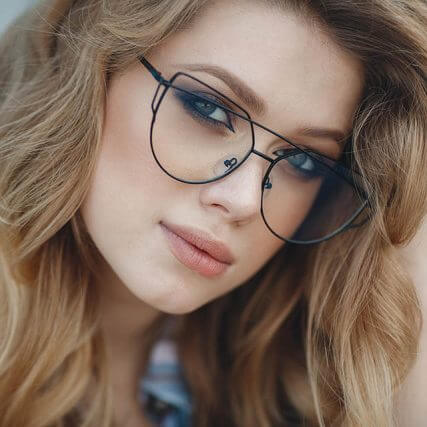High-End Lenses • Progressive • Polycarbonate & Bifocal Lenses
Best Lenses for Eyeglasses in Virginia Beach, VA
If you’re uncertain about which type of lenses are best for your vision and lifestyle needs, our friendly, knowledgeable optical staff is here to help. To get started, read the following explanation of the basic types of lenses available for eyeglasses.

What are Progressive Lenses?
If you’re over 40 years old and find it difficult to focus on print or objects up-close, you probably have presbyopia – a normal, age-related vision condition. In the past, reading glasses (AKA readers) were the only solution to provide crisp near vision for people with presbyopia, but now progressive lenses are a popular option. Our eye doctor recommends these multifocal lenses for many patients who visit our optical store in Virginia Beach, VA.
Progressive lenses have three prescriptions built into one pair of glasses. These different lens powers allow you to do a range of tasks without switching your eyeglasses. For example, you can read a print book up close, use a computer at middle distance, and see distant road signs when driving.
In contrast to bifocal or trifocal lenses, progressive lenses have no unattractive line that cuts across the lenses. This makes them a much more appealing prospect for many people who refused to wear reading glasses due to how “old” of an appearance they had.
Progressive lenses add a new level of convenience to vision with presbyopia. With these all-in-one glasses, there’s no need to always keep another pair of eyeglasses in your bag or car or desk.
One minor drawback to progressive lenses is that there is a short adjustment period. You’ll need to train yourself to look out of the lower part of the lens when you’re reading, to look straight when gazing into the distance, and to direct your eyes somewhere between those two zones when using middle-range sight. However, after a short learning period, most people find that their vision with progressives feels very natural. There’s no “jump” like you would get when wearing conventional bifocals.
Typically, progressive lenses cost more than traditional bifocals, but the vast majority of patients report that the improved visual clarity, attractive appearance, and convenience is worth it!
What are Polycarbonate Lenses?
Polycarbonate is a particular type of strong plastic that’s often used in eyeglasses, as well as in car headlights, DVDs, and a range of industrial applications. It is a thermoplastic, which starts as a solid material that is melted and injected into lens molds, compressed under high pressure and then cooled – all within minutes.
A primary reason for using polycarbonate lenses in glasses is because they are virtually indestructible, offering enhanced safety for your eyes. They are known to be 10x stronger than traditional plastic. This characteristic makes them durable for daily wear and long-lasting.
In addition to being impact-resistant, polycarbonate is also friendly to eye health because it offers UV protection, blocking dangerous sun rays from reaching your eyes. The UV protection is built-in, so no additional lens coatings are needed for sun safety.
Another benefit of polycarbonate lenses is that they are usually thinner than lenses made from other materials. They correct vision without adding thickness, making them a perfect match for people with high prescriptions. Lighter, thinner eyeglasses look nicer, are more comfortable to wear and less likely to slip down your nose.
Children and athletes are often great candidates for shatterproof polycarbonate lenses because of their ability to withstand the rigors of an active lifestyle. Most sports sunglasses and safety goggles are crafted with this lens material.
Because polycarbonate lenses are so flexible and impact-resistant, they are also softer than other lenses. That means they scratch more easily. To solve this problem, modern polycarbonate lenses are generally covered with a scratch-resistant coating that makes them almost as hard as glass.


What are Bifocals?
The word “bifocal” often conjures up images of a grandmother with frames hung on a chain around her neck. That’s because they are most often prescribed for people with age-related presbyopia. But really, the invention of bifocals (credited to Benjamin Franklin) is what eliminated the need for an extra pair of glasses hung around your granny’s neck.
Bifocals function as an alternative to wearing single-vision prescription lenses and carrying around an additional pair of reading glasses. Bifocal eyeglasses lenses have two different lens powers to give you clear vision of objects at different distances, up-close and in the distance.
Typically, a small section of the lower part of the lens contains the power needed to correct near vision – objects within 18 inches of your eyes. This portion of the lens may be a half-moon shape, rounded, a narrow rectangle, or the full bottom half of a bifocal lens (also called Executive style or Franklin lenses).
The upper portion of the rest of the lens is usually for distance vision, so you need to look up and through that zone in order to focus on a faraway view.
A line bisects bifocal lenses to separate the two lens power zones. This line usually rests at the same height as the wearer’s lower eyelid. Because of this line, many people find bifocals to be unattractive and they avoid wearing them for that reason.
Vision through bifocal lenses may not feel as natural as when looking through progressives or single-vision lenses. Many people describe the bifocal line as causing an abrupt change or distracting jump in their vision.
